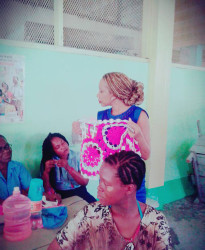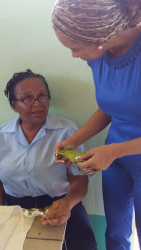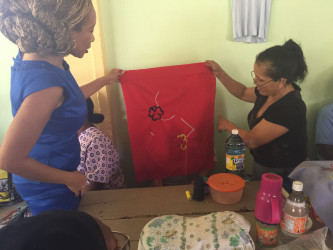There is an abundance of skills in the women’s section of the New Amsterdam Prison, which local fashion designer and businesswoman Sonia Noel sees as a potential commercial hub that could allow inmates to earn some money.
Noel, who recently visited the prison, which is country’s only facility for female inmates, said it was overwhelming to hear that many of the women have young children who are being cared for by elderly grandparents who do not have a means of income. Monetising their skills, she says, would provide them with an opportunity to take care of their children while they are behind bars and can assist in them being able to start businesses when they leave prison.
She is well aware that the inmates have the potential to produce quality items, including clothing, which can be sold locally and on the international market.

Noel, the founder of the Women’s Association for Sustainable Development (WASD), said that she has already shared her idea of turning the women’s skills into a business venture with Minister of Public Security Khemraj Ramjattan and was given a favourable response.
Speaking to Stabroek News recently, she said that for a third time in several years, she travelled to the location to visit the women on March 10.
While speaking with the inmates in the dining hall, she recalled seeing one woman knitting a vest with a Bob Marley theme. Describing it as “beautiful,” Noel, who has been in the fashion industry for almost two decades, said from her previous visits she had recognised that the skills that some of the inmates possessed could be turned into an economic activity.

On her previous visits to the prison, she said, she had thought about business at the prison but did not have much time to explore it further. The idea also entered her mind when 12 pieces of their work were displayed at Guyana Fashion Week several years ago.
Noel just concluded her first Women in Business Expo and is already visualising the items produced by the female inmates being displayed at next year’s staging.
From her interactions, she discovered that most of the women incarcerated are single-parent mothers. One indicated to her that she had seven children, while another said that her youngest child was six months old.
Noel said that it is very evident that the prison system has a business potential that can be tapped into.
“That is what we want. We want the ones who are already in there who can produce and the ones we can train because it is going to be greater for our

country,” she said.
She added that as long are things are done in the right way, the possibilities for the venture are endless.
Creative talent
Noel recalled that a Trinidadian friend of hers left prison with US$45,000 and was able to use this money to open a state-of-the-art beauty salon on completion of her sentence. The woman, Noel explained, was a cosmetologist and while in prison there was a section where persons were trained in the field as well as a salon. “So she earned money from training and working in prison. US$45,000! So you could imagine if you apply a system similar to that here in Guyana?” she said.
She noted that Bibi Sharima-Gopaul, who is serving a lengthy sentence for murdering her daughter Neesa Gopaul, is a seamstress. Stabroek News was told by a former inmate that Sharima-Gopaul sews the prison uniforms for inmates.
According to Noel, Sharima-Gopaul has the potential to train inmates in the art of sewing.
She informed that one of her aims is to have a sewing room in the prison, so that inmates can actually take orders and sew pieces. She said that there are prisoners who are good at stitching on beads and others who can paint. Her vision for the sewing room is to have inmates working together in a single space to produce clothing, which, when completed, can be worn by those on the outside.
Noel said that half of the women she spoke with should not be behind bars as other means of punishment could have been found.
Most of them, she said, missed their child/children the most.
Noel said that any inmate would feel less of a parent knowing that other people have to take care of her children in every aspect until she has completed her prison sentence. “If you know that you can earn some money while you are in there and you are contributing to that child’s well-being, you would be happier,” she said, while adding that this applies to both male and female prisoners.
“Imagine you are in there [prison] and you can help your child with transportation to university, if you can contribute that much,” she said.
She added that during her visit she got a chance to visit the male section of the prison and was amazed at some of the items being produced there.
According to Noel, she saw bed heads and metal gates and was left in awe. She said that what was even more amazing was that the prisoners did not even have the required tools and yet their output was good.
“We have to use this creative talent that we have in the prison system, whether it is male or female, … [so] that it gives them a purpose, it helps them as a person to make a meaningful contribution to whoever they have on the outside,” she stressed.
She said that commercialising the items produced presents an opportunity for the inmates to make something of themselves when they leave prison. She said that having a conviction is a hurdle when seeking a job and that the system has to be set up in such a way that the inmates are presented with an opportunity which will ensure that they can earn and not return to prison.
Noel said the idea of starting a commercial operation in the prison was also favoured by the prisoners.
“We want people to come out not angry with the world, themselves, angry at everyone. We want people who can fit back in,” she stressed.
Hope
Noel said that she and two other members of WASD visited the prison in observance of International Women’s Day and to conduct motivational talks for the women since they are often forgotten.
“They are still women and they still need to be celebrated in some way and still need to be reassured that there is hope, even in prison, there is life and you have to keep that mindset positive to survive prison and to be still intact coming out of prison,” she said.
She added that the visit was emotional.
“It is always emotional because, of course, you have one on one with people and you chat with people and realise that none of us are without flaws… none of us can cast the first stone and we all make mistakes,” she said.
She added that sometimes when one hears the stories, they are emotional and heart rending and it is for this reason she does not judge people. “What really angers me sometimes is on social media, especially when young women get caught with drugs, you hear all sorts of comments… but you don’t know… especially single mothers, sometimes they are desperate, wanting to provide…,”she said.
Noel added that many of the stories she heard followed this line.
She hopes that sometime in the near future a branch of WASD can be formed at the prison.





